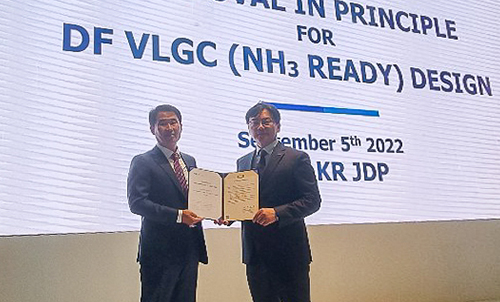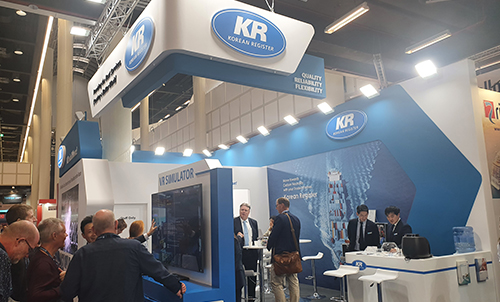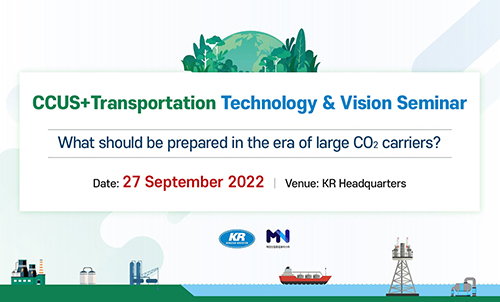Inside KR
KR Decarbonization Magazine
VOL.01 | WINTER 2022
KR & DSME Collaborate on
Large Scale Liquefied CO₂ Carrier Technology

KR and Daewoo Shipbuilding & Marine Engineering (DSME) will be developing a new 40,000m3 LCO2 carrier featuring a next generation cargo handling system. The two Korean firms signed an MOU at Gastech 2022 in Milan, Italy on 7 September to help meet the growing demand for vessels capable of transporting carbon dioxide at scale from emissions sources to storage sites.
Carbon Capture, Utilization and Storage (CCUS) technologies are fast growing as the world seeks to achieve carbon neutrality and build an international carbon capture infrastructure.
However, carbon dioxide is a complex cargo to handle, having a triple point which is higher than atmospheric pressure, meaning that it can liquefy only at low temperatures and high pressures. Even a small environmental change can see CO₂ transform into a gas, liquid or solid state. The new design will feature a reliable Ship and Cargo Containment System (CCS) using its accumulated technologies in the field of liquefied gas carriers, such as LNG and LPG carriers.
DSME will also develop a Cargo Handling System (CHS) using the latest technology to prevent CO₂ emissions and ensure navigational stability.
KR plans to verify compliance with its own Rules and The International Code of the Construction and Equipment of Ships Carrying Liquefied Gases in Bulk (IGC Code) for the cargo containment and handling systems developed by DSME.
KR & DSME Collaborate on
Eco-Friendly Ship Propulsion Systems

KR and Daewoo Shipbuilding & Marine Engineering (DSME) will be working closely together to develop new propulsion systems capable of handling green fuels including ammonia and hydrogen.
In September 2022, the two organisations signed a Memorandum of Understanding (MOU) to jointly collaborate at Gastech 2022, Milan, Italy. The move follows announcements that KR would be jointly developing a liquefied CO₂ carrier with DSME.
Whilst the global maritime industry is introducing operational measures such as limiting engine output and installing energy-saving devices to meet stringent greenhouse gas regulations, in the longer term green fuels will be needed to achieve substantial emission reductions.
There is a high level of market interest in propulsion systems and materials for operating with green fuels such as ammonia, hydrogen and methanol.
Ammonia and hydrogen, widely recognized as green alternatives, but are considered to have more sensitive characteristics than commonly used LNG fuels. To be used as a marine fuel, extra technical requirements need to be addressed. These include the toxicity of ammonia, hydrogen embrittlement, cryogenic conditions equivalent to -253°C, diffusion characteristics, as well as ensuring the same level of safety as existing ships.
This joint research agreement between the two parties will build on the unique strengths and accumulated technology of each company.
DSME aims to commercialize ammonia-powered container ships by 2025 based on its advanced technology, and is at an advanced stage in developing eco-friendly fuel technologies, including low-carbon ammonia carriers and liquefied CO₂ carriers.
KR has also been actively seeking better options for decarbonization pathways. As well as publishing guidelines for ammonia-fueled ships, the classification society is developing its own hydrogen-powered ship rules and is working on enhanced decarbonization initiatives to ensure ship safety and a greener future.
KR Approved Samsung Heavy Industries’
Ammonia-Ready VLGC Design
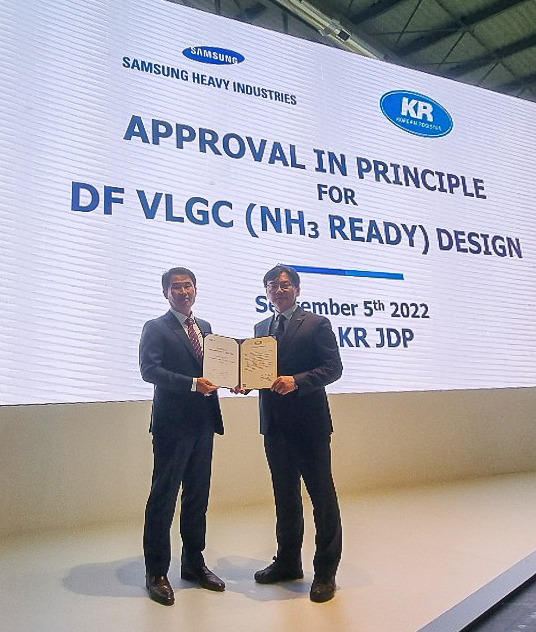
KR has granted an Approval in Principle(AIP) for a new ammonia-fuel ready vessel design developed by Samsung Heavy Industries (SHI) on September 5. The Very Large Gas Carrier (VLGC) will be capable of using ammonia as a fuel as well as carrying it as bulk cargo.
Jointly developed by SHI and KR, the new design represents a significant step forward in the expansion of an international supply chain for the clean fuel.
Ammonia is a stable, cost-effective and clean energy source, however it could cause stress corrosion cracking in carbon manganese steel or nickel steel. To minimize these risks, management of the tensile stress and corrosive environment of the steel is essential concerns to be considered. The SHI design maintains the actual yield stress of the ammonia tank steel within the KR’s Rule requirements and is able to maintain a temperature close to boiling point.
The new design is the largest ammonia-ready vessel which have been approved by KR. The classification society also recently approved designs for a 60,000m3 ammonia-fueled ammonia carrier and a 38,000m3 ammonia carrier/bunkering vessel. KR is further supporting the development of ammonia-related technologies by developing its guidance for ammonia-fueled ships, and its participation in the Green Ammonia Marine Transport and Bunkering Consortium.
Introduction of KR-GEARs at SMM2022
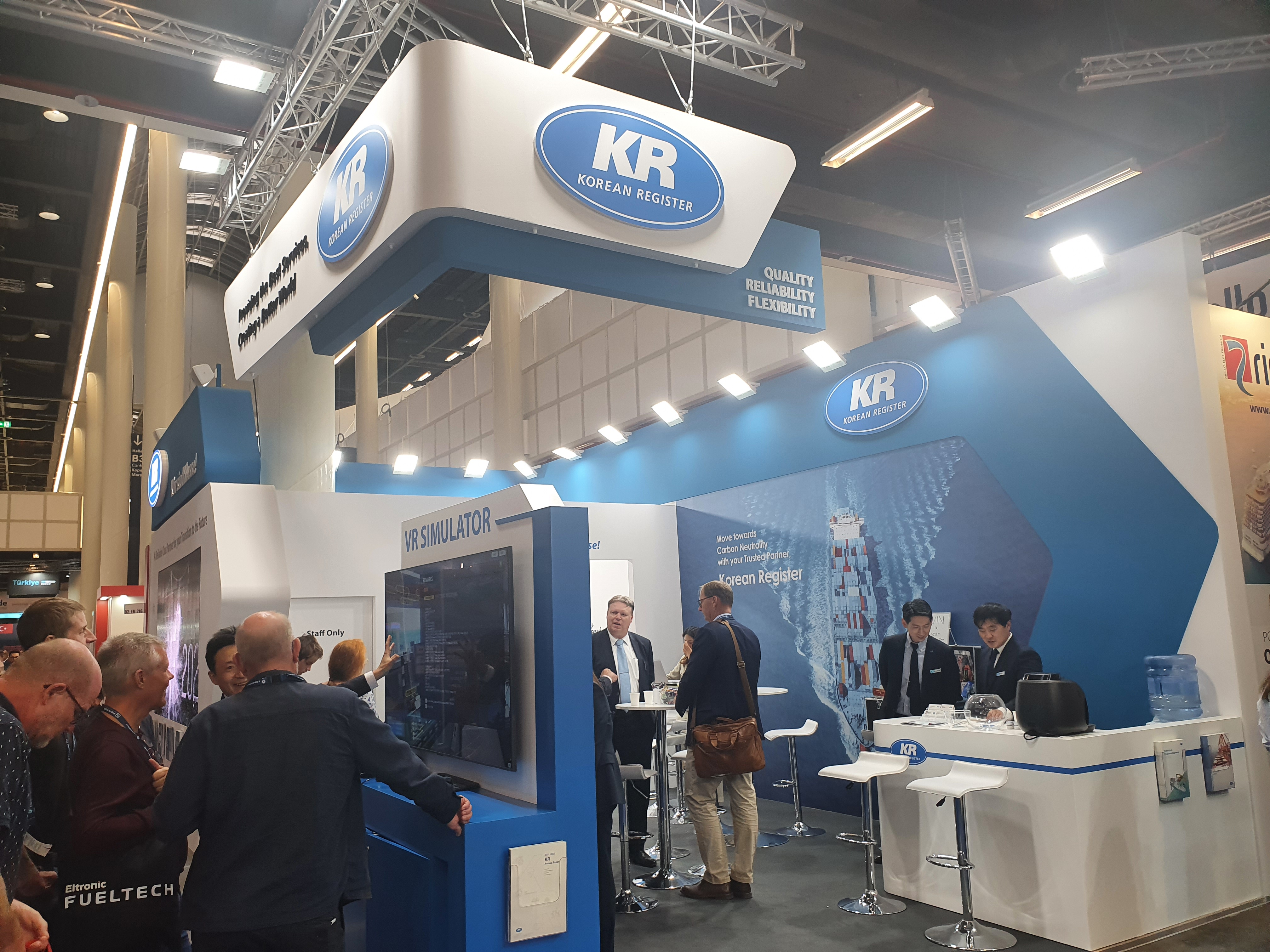
KR participated in the Shipbuilding, Machinery and Marine Technology trade fair 2022(SMM 2022), one of the world's three largest shipbuilding and marine exhibitions, and extensively promoted KR-GEARs to 2,000 companies from 100 countries worldwide from September 6 to September 9 in Hamburg, Germany.
KR-GEARs, launched in July 2019, is a GHG emission authentic reporting system that could guide shipowners and operators to manage EU Monitoring, Reporting and Verification (EU MRV), IMO Data Collection System (IMO DCS), Carbon Intensity Indicator (CII) and EU Emissions Trading System (EU ETS) within a single platform. The event was also a great opportunity to introduce GHG verification service and technical guidelines for SEEMP Part III, which will take effect in 2023.
As the energy efficiency ratings of all ships have become transparent due to the introduction of the CII regulation, continuous fleet management support beyond simple regulatory implementation has become necessary. To support the maritime sector in complying with stringent GHG regulations, KR presented its CII simulation module, energy efficiency improvement scenario and prediction service. This was a great opportunity for the KR team to share its ongoing efforts and technological expertise with the maritime industry.
Besides participating in SMM 2022, KR visited Briese Schiffahrts GmbH & Co. KG(Hereafter, Briese), a German company that owns about 100 multi-purpose small-ships, approximately 10,000 DWT or less. During the visit, KR and Briese exchanged thoughts on how KR-GEARs could help Briese to prepare for upcoming GHG regulation, also, the two companies agreed to collaborate further on technology exchange.
KR Awarded AIP for '120kW Fuel Cell Power System'
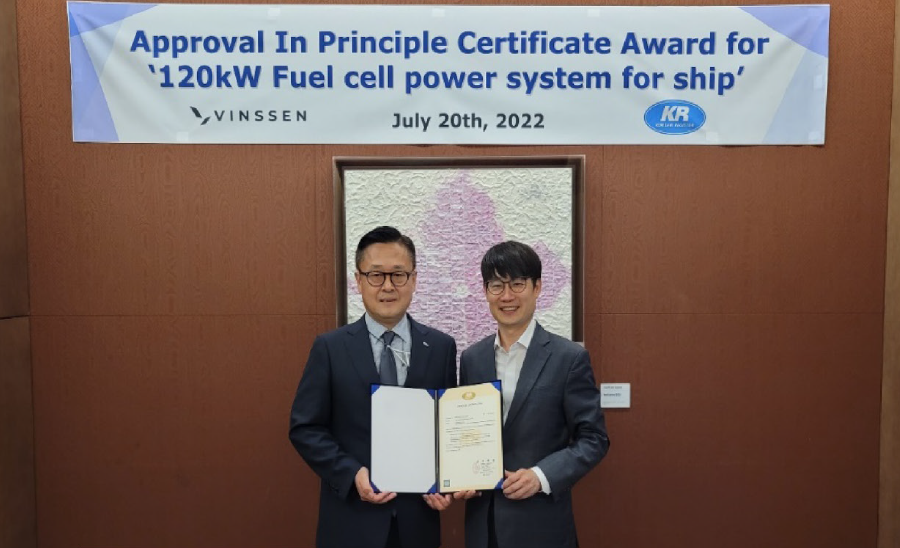
KR has issued the first Korean Approval in Principle(AIP) to Vissen Co., Ltd. for its 120kW fuel cell power system.
Vissen Co., Ltd. is specialized in manufacturing eco-friendly small-sized ships and propulsion systems, especially in electric and hydrogen hybrid.
The 120kW fuel cell power system is an integrated system that produces electric power not only for main propulsion but also for various auxiliary systems mounted on the ship. This system consists of a hydrogen storage system, an air treatment system for filtering, air & hydrogen supplying system to the fuel cell module, a thermal control device for cooling the fuel cell module and BOP system, and a power conversion device for supplying the generated power to the grid. The fuel cell module composed of two fuel cell stacks has been developed to produce continuous power of 120kW by application of PEMFC suitable for small-sized ships.
The AIP is an opportunity to preemptively secure technology for developing and distributing eco-friendly ships. Competition in this sector is intensifying and this AIP will enhance the product’s competitiveness and accelerate the realization of carbon-free ships.
KR Hosted CCUS+Transportation
Technology & Vision Seminar
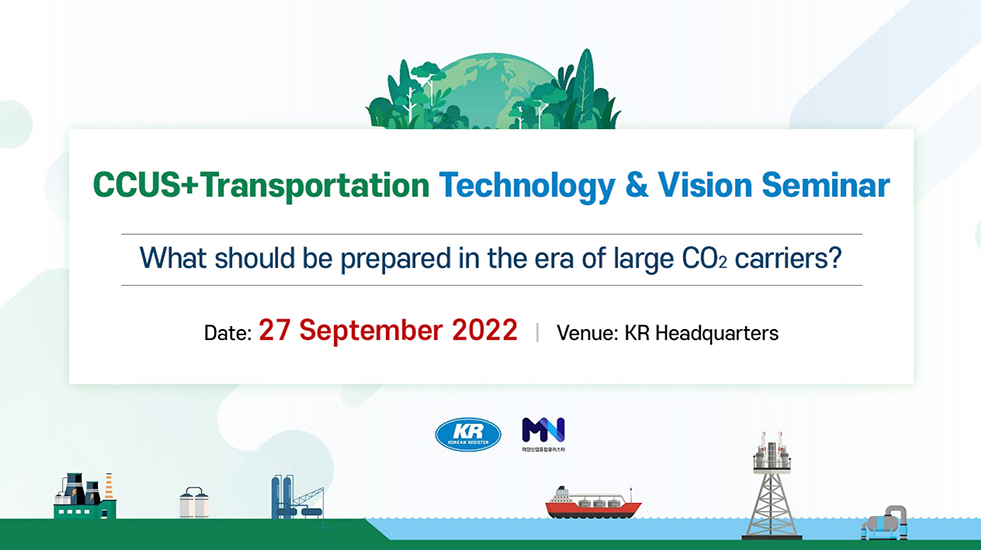
On September 27, KR and Maritime Cluster Networking in Korea (MacNet) co-hosted the CCUS+Transportation Technology & Vision Seminar called ‘What should be prepared in the era of large CO₂ carriers.’
Carbon Capture, Utilization and Storage (CCUS) is a technology that collects large-scale carbon dioxide generated from thermal power plants, steel mills, and refineries and stores it in waste oil fields, waste gas fields, or marine sediments. It is considered one of the key technologies for achieving global carbon neutrality. As marine transportation is emerging as a representative method of transporting captured carbon dioxide to the storage location, the global marine transportation market is preparing for the carbon-neutral era by rapidly placing orders for carbon dioxide carriers.
CHUN Kangwoo, KR General Manager of the Green Ship Technology Team, proposed a new research plan for the development of CO₂ carrier technology that can transport high-purity CO₂ in large quantities. The project aims to develop technologies regarding cargo tanks, cargo management, loading and unloading for innovation in CO₂ carriers.
In addition, a total of five topics were presented during this seminar: carbon dioxide capture demand and technology development in the domestic industry; domestic and overseas carbon dioxide storage in the ocean; carbon dioxide transport and storage using oil and gas fields; global carbon dioxide carrier construction technology trends; and international regulations.
KR is committed to continuing to take the lead in technological cooperation for Decarbonization with the maritime industry stakeholders and take actions to accelerate achieving carbon neutrality.
